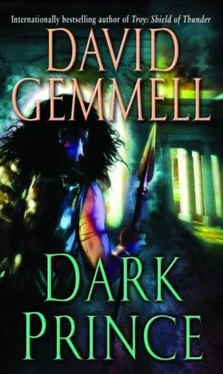The Demon King laughed. 'The first to die,' he said, gathering his blade from where it had fallen during the struggle with Brontes. 'Come, let me arrange your journey to Hades.'
Helm said nothing but his advance continued. Philippos leapt to meet him, blade stabbing forward in a disembowelling thrust. Helm parried it, sending a reverse cut that sliced through the skin of the Demon King's bicep.
Philippos jumped back, gazing down in horror at the blood oozing from the wound.
'I cannot be hurt!' he screamed. 'I cannot!'
Helm paused and, lifting his left hand, removed his helmet. Philippos reeled back, the light fading from his golden eye.
Warriors of both armies stood transfixed — for facing the Demon King was his twin, save that his eye was not gold but the colour of opal.
'Who are you?' whispered Philippos.
'Philip of Macedon,' the warrior answered.
The Demon King tried a desperate attack, but it was easily parried and Philip's blade plunged into his enemy's throat.
Blood bubbled from Philippos' mouth. 'That,' hissed Philip, 'is for threatening my son! And this is for me!' The sword slashed in a glittering arc, decapitating the Demon King. The head fell to the left, bouncing on the hard-packed earth.
The body, spouting blood, pitched to the right.
'Is that dead enough for you?' asked Philip.
* * *
The aftermath of the battle proved long and mind-numbingly complex. The disarmed Makedones were herded together and Parmenion called their officers to him. They were, he told them, free to return to Makedon, there to elect a new King. But first they were obliged to swear sacred oaths that they would help to rebuild the ruined city of Kadmos. This they did. The baggage-train of the Makedones was captured, and with it the enormous wealth accrued by Philippos. This was taken by the Spartans, but Parmenion promised one-half of it to the victims of Makedones aggression, including twenty gold pieces for every slave who had fought alongside him.
The surviving slaves and half the Spartan army were sent back to the city, while Brontes agreed to lead Gorgon's followers to the Giant's Gateway, there to await Parmenion's arrival.
Emissaries arrived from the scattered Illyrians and Thracians, begging for peace terms. These were granted, on the understanding that the warriors returned immediately to their homelands.
During all of these negotiations Makedones and Spartan surgeons moved among the wounded of both sides, performing operations under torchlight.
By the end of the day more than 11,000 enemy corpses had been counted on the battlefield, another 4,000 slain in the attack on Sparta. The Makedones dead were stripped of their armour, while their living comrades dug several mass graves. The 870 Spartan dead would be returned to the city for honourable funerals. Of the slaves more than 2,000
were dead. The Spartans dug a special grave for them, and Leonidas promised that a monument would be raised above it.
Long after midnight Parmenion finally retired to the tent of Philippos, and was there joined by Philip, Attalus and Leonidas.
'I do not understand,' said Attalus, as the three men relaxed, 'how the Demon King was slain. He was said to be invulnerable.'
'Except to self-inflicted wounds,' Parmenion told him wearily. 'Philip was… is… Philippos: the same men in different worlds. I would imagine that the spell protecting him could not differentiate between the two.'
Leonidas rose. 'I will leave you friends alone together,' he said. 'But first may I speak with you privately, sire?'
Parmenion nodded and followed the young Spartan from the tent.
'I think I know what you are going to say,' whispered Parmenion, 'and I have not forgotten my promise. Will you allow me to ride to Sparta one last time to say farewell to Derae?'
Leonidas shook his head. 'You are wrong, my friend. I am asking you to stay. There is so much to be done now. Who else would be King? Timasion? He will want to go to war with Korinthos and Messenia. He would seek to punish our enemies, creating new hatreds. Lycon is too young and headstrong. There are no others.'
'You do yourself an injustice. You would make a fine King.'
Leonidas smiled. 'Not so, Parmenion. I am a warrior, that is enough for me. Think about what I have said. We need you here.'
The officer walked away into the night, past the glittering torches that lit the battlefield. Parmenion stood silently staring out over the plain, then a hand touched his shoulder. 'There is much to what he says.'
Parmenion nodded. Philip took his arm and the two men strolled out, avoiding the camp-fires around which the Spartan soldiers slept.
'This would be a good life for you, Parmenion. Here you are revered as a saviour. You could build an empire.'
'I have no wish for empires, sire. And I have never desired to be a King.' The Spartan sighed. 'This is not my world.'
'You know how much I need you, and it would hurt like Hades to lose you. But think carefully about this,' Philip advised.
'I shall. But tell me, how did you become Helm?'
Philip swore, then laughed. 'The day after you left a man came to see me, saying he had news of Alexander. Since he insisted on seeing me alone, he was brought to my chambers. Naturally he was searched, but he carried no weapons.
In fact, apart from his clothes he had only a small leather pouch containing a stone veined with gold. A lucky charm, he said. He entered the room — and that is the last I remember. I awoke in a graveyard. Can you believe that? How he spirited me here I do not know. Nor do I know why he took away my memory and turned my face to metal.'
'I would guess that the man was Aristotle,' said Parmenion, 'and I cannot say why he left you with no knowledge of your identity, but the metal face was a great protection. Had you been recognized as Philippos your life would have been short indeed.'
'Philippos,' whispered the Macedonian, letting the name hang in the air. 'Was he truly me? Do you think I could be like him? A destroyer, a demon?'
'No, sire. He was possessed. Driven by a spirit of Darkness.'
'Even so, his army swept across the world much as mine has in the past. It is not a good feeling to see such savagery from the side of the victims.'
‘Perhaps it is,' argued Parmenion.
Philip chuckled. 'Maybe,' he agreed. 'When we get home I shall rethink my plans. Diplomacy shall be the key. I shall convince the Athenians, the Spartans and the Thebans to make me the leader of Greece. Only then will I carry the war into Persia. I shall never be a Philippos, Parmenion. Never.''
'I do not doubt that, sire. It would never occur to me that you would.'
'Stop calling me sire. Here you are the King and I am the soldier.'
'Old habits die hard. . Philip.'
The Macedonian looked into Parmenion's eyes. 'I will not forget what you have done for me, and for my son. You are a good friend, Parmenion; the best a man could have.' Unfastening the necklet which had protected his thoughts from the Demon King he clasped it around Parmenion's neck once more.
Suddenly uncomfortable, Parmenion said nothing and the King laughed, clapping him hard upon the shoulder. 'You always were uneasy with compliments, Spartan. Come, let us celebrate your victory and get drunk together.'
But when they returned to the tent Attalus was asleep upon a couch and, after only a single goblet of wine each, consumed in comfortable silence, Philip also declared himself weary and settled down on the floor to sleep.
For a while Parmenion lay awake, his thoughts jumbled, a series of almost kaleidoscopic images tumbling through his mind. Derae, Phaedra, Thena, Alexander, Leonidas. . Two worlds and a choice of lives. A king or a general.
Derae or Phaedra? The latter he did not love, but she had borne his children and duty demanded he return.
Читать дальше












